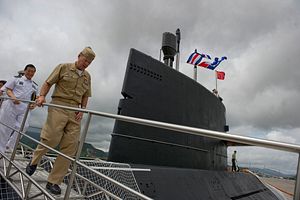Faced with a rising tide of public discontent, Thailand’s government has officially postponed the purchase of two submarines from China, withdrawing its request to parliament to include the sum for an initial payment in next year’s national budget.
The Chinese submarine procurement deal was announced in June 2015, a year after Prime Minister Prayut Chan-o-cha, then the army chief, seized power in a coup d’état. The coup led to souring relations with the United States. In 2017, Thailand’s cabinet approved the purchase of the first submarine for 13.5 billion baht ($434.1 million), with delivery expected in 2023.
But the purchase of the remaining two diesel-powered Yuan-class S26T submarines, which will cost Bangkok an additional 22.5 billion baht ($720 million) over seven years, has attracted heated controversy.
Observers have long questioned the wisdom or necessity of the procurement, which has often been attended by a lack of public disclosure, but it seems especially questionable amid the economic devastation of the COVID-19 pandemic. Although Thailand has managed to contain the virus with considerable success, the global pandemic has caused the country’s economy to shrink 12.2 percent in the second quarter — its largest economic contraction since the Asian financial crisis of 1997-98.
When a house budget subcommittee in August voted narrowly to allocate more than 3 billion baht in the 2021 budget, the first of seven annual payments for the submarines, the public reaction was overwhelmingly negative, as critics questioned spending on a costly extravagance at a time of severe economic distress. The news added fuel to the recent string of student-led anti-government demonstrations that are calling for the resignation of Prayut’s government and the drafting of a new constitution, in addition to unprecedented calls for reform of the Thai monarchy. On Twitter, a Thai hashtag translating as #PeopleSayNoToSubs trended.
In addition to drawing fire from opposition lawmakers — Yutthapong Jarassathian, a member of the Pheu Thai party and deputy chairman of the budget subcommittee declared that Prayut faced a choice “between the submarines and the economic survival of the people” — the deal also threatened to drive a wedge into Prayut’s fragile governing coalition, with the Democrat Party threatening to break ranks and oppose the budget allocation.
As things stand, the government has postponed payment until fiscal year 2022, and according to Thai media reports, has already gained Beijing’s agreement for the delay. Government spokesman Anucha Burapachaisri Anucha told the press that the earmarked money will instead be used for other purposes, including COVID-19 relief.
The Royal Thai Navy (RTN) has long harbored ambitions to acquire a submarine fleet. Since the 1990s, the country has attempted to ink procurement deals with several countries, including Germany and South Korea, but all have fallen through. Its procurement from China is designed to address perceived defense vulnerabilities, especially in the context of rising tensions in the South China Sea. The shallowness of Thailand’s littoral waters suggests that the procurement may also be driven in part by sectional interests within the RTN as well as by the navy’s openly expressed desire to catch up with Thailand’s maritime Southeast Asian neighbors, many of whom operate submarine fleets. Vietnam has the largest fleet in the region, consisting of six Kilo-class vessels purchased from Russia. Indonesia has five submarines, while Singapore and Malaysia hold four and two of the vessels, respectively. Even Myanmar last year acquired a submarine from India.
While emphasizing that the purchase has not been scrapped, Prayut’s postponement has allowed him to preserve the unity of his rickety governing coalition. It is also a pragmatic concession to public opinion, at a time when key Thai institutions — especially the monarchy and military — are coming under intense public scrutiny. But depending on the length and severity of Thailand’s economic downturn, the submarine controversy could well resurface again in a year’s time.































